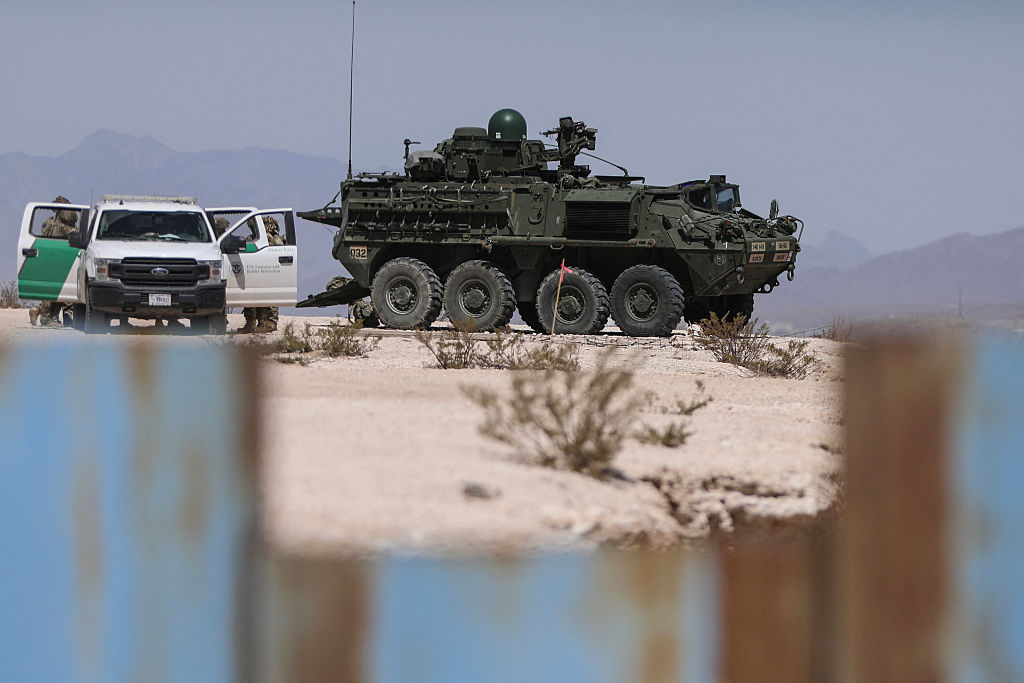
President Donald Trump has directed the Pentagon to prepare options to use military force against Latin American drug cartels, according to reports by the New York Times, the Wall Street Journal, and other news organizations.
Trump has prioritized stopping illicit drugs, including fentanyl, from entering the U.S., and this decision is his administration’s most aggressive thus far to dismantle drug trafficking organizations. According to a senior officials consulted by the WSJ, the options under discussion are focused on special forces operations, intelligence support, and precision targeting. In tandem, the newspaper reported, the U.S. and Mexican officials are drafting an agreement that would include intelligence sharing and enforcement coordination in acting against cartels.
On Friday, President Claudia Sheinbaum said that Mexico had been informed about Trump’s directive to the Pentagon and that it solely concerned activity in the U.S., and she rejected the use of U.S. military forces in her country. Analysts in the region are still trying to decipher what Trump’s order could mean, the NYT reported.
Earlier this year, the White House designated specific Latin America-based criminal organizations as foreign terrorist organizations (FTOs), including several Mexican cartels, Venezuela’s Tren de Aragua (TdA), and El Salvador’s La Mara Salvatrucha (MS-13)—all on January 20—and on May 2 added Viv Ansanm and Gran Grif in Haiti.
AQ asked analysts to share their reactions and perspectives.

Heidi Jane Smith
Smith is a research professor of economics at Universidad Iberoamericana, Mexico City
Trump’s decision to place the U.S. military on watch for operations against Mexican criminal cartels—framed by U.S. Ambassador to Mexico Ronald Johnson as part of a joint anti-terrorist strategy with President Sheinbaum—marks a sharp escalation and a departure from previous bilateral security cooperation. For example, Plan Mérida, launched in 2008, was a capacity-building initiative focused on U.S. funding for equipment, training, judicial reform, and institutional strengthening, avoiding direct U.S. operational involvement in Mexico.
In 2021, under the Biden and López Obrador administrations, Plan Mérida was formally replaced by the Bicentennial Framework for Security, Public Health, and Safe Communities, which shifted the emphasis toward addressing root causes of violence, strengthening public health approaches to drug use, and fostering community-based prevention.
In contrast, Trump’s current military watch posture is an operational readiness stance that explicitly designates cartels as “terrorist organizations,” opening pathways for rapid U.S. military engagement and placing immediate pressure on Mexico to commit to targeted actions such as dismantling local cartel support networks. While both approaches frame the fight against organized crime as a shared responsibility, Trump’s strategy emphasizes deterrence through force projection rather than long-term institutional reform.
The rhetoric stresses shared sovereignty and a common enemy, but the operational reality may involve greater U.S. pressure on Mexico for commitments in intelligence-sharing, joint targeting, and local-level dismantling of cartel infrastructure. This stance risks deepening Mexico’s internal militarization—already visible through armored tactical vehicles, heavy artillery, arms and soldiers in the streets—raising concerns over civil-military balance and human rights, while sidelining police reform and judicial capacity-building. Politically, it could strengthen U.S. leverage in security negotiations and the broader bilateral agenda, but also inflame nationalist sentiment in Mexico and complicate domestic consensus around sustained cooperation.

Robert Muggah
Muggah is a co-founder and research director of the Igarapé Institute, a leading think tank in Brazil
Notwithstanding U.S. claims legitimizing the use of force against criminal organizations, the legal foundation for the August presidential directive is fragile. Sanctions and asset freezes fit within U.S. law, but launching wartime-style strikes abroad without congressional approval or a UN mandate risks violating domestic prohibitions on assassination and international sovereignty norms.
Diplomatic backlash is inevitable. Mexican President Claudia Sheinbaum has rejected any U.S. military presence, stressing that cooperation does not extend to “invasion.” Even strikes launched from international waters or U.S. airspace would likely be seen as violations of sovereignty. President Trump’s suggestion during his first term to “bomb drug labs” in Mexico caused outrage; a live military campaign would be incendiary.
Mexico’s underworld is no longer dominated by a handful of hierarchical cartels but is a patchwork of over 440 groups, from multinational networks to hyper-local gangs. Many span multiple illicit markets, ranging from oil theft and human trafficking to kidnapping and money laundering, while embedding themselves in legal economies and influencing politics.
Such complexity makes decapitation strikes a blunt instrument. Eliminating leaders or facilities may scatter networks, but often triggers violent turf wars. Lessons from counter-terrorism and counter-narcotics point to intelligence-led policing, targeted interdiction, financial disruption, and judicial reform as more sustainable solutions.
The U.S. threats are already generating economic and geopolitical ripples. The U.S. FTO designations have extraterritorial reach, potentially ensnaring banks, shippers, and NGOs for perceived links to designated groups. Compliance burdens will rise, especially in Central America and the Caribbean, where dollar-clearing access is already fragile. Regional governments fear legal and operational spillover, while public opinion, shaped by memories of past U.S. interventions, remains skeptical.
For the Trump administration, recasting cartels as terrorists serves both domestic politics and regional strategy. At home, fentanyl justifies sweeping crackdowns; abroad, the posture signals U.S. resolve. Whether it deters cartels or distracts from more effective tools remains the question. In the Americas, as elsewhere, dramatic gestures win headlines; durable gains win wars.

Diego Marroquín Bitar
Marroquín Bitar is a fellow at the Center for Strategic and International Studies
Decades of trust-building have made Mexico a critical U.S. ally, but the prospect of unilateral U.S. military action in Mexico could undo it all. The journey from distant neighbors to strategic partners has been long and winding, forged through deep familial ties, intense economic exchange, and political leadership that had the foresight to see North America as the best platform for U.S. innovation and global competitiveness. Such action would not merely roll relations back to the pre-NAFTA era of distrust, but risk returning them to the antagonism of the 1840s.
Following President Trump’s hardline rhetoric and economic coercion toward Mexico, President Claudia Sheinbaum chose diplomacy over confrontation, an approach that has delivered results. A permanent U.S.-Mexico working group now coordinates on security, migration, border management, water, and economic issues. Fentanyl seizures have surged, including a record bust of 1.1 metric tons in December 2024. In February 2025, Mexico transferred 29 high-level criminal suspects to U.S. custody.
On migration, Mexico’s National Guard expanded deployments to the border, contributing to the lowest rate of unauthorized crossings since the 1960s. Mexico has also authorized U.S. surveillance drones over its territory, acknowledged their value in counter-cartel operations, and agreed to coordinated patrols with the U.S. military.
Still, Mexico has drawn a firm red line: no U.S. boots on the ground (drone strikes). Sheinbaum has been unequivocal: “Sovereignty is not for sale.” Unilateral U.S. action inside Mexico would not only erase the trust (re)built since the end of the AMLO administration but also strengthen the most radical wing of Sheinbaum’s Morena party, pushing Mexico closer to non-alignment and thus away from North American institutions and collaboration channels. It would also undermine Mexico’s ability to negotiate the 2026 USMCA review in good faith, and a new U.S.-Mexico security pact to combat drug trafficking would also be at risk.
The proven gains of cooperation, whether in combating organized crime or managing migration, far outweigh the fleeting appeal of unilateral action. The path forward must remain one of partnership, not military intervention.

Matteson Ellis
Ellis is the Latin America practice lead at Miller & Chevalier
The report of a secret directive from the White House to the Defense Department to begin using military force against cartels designated as FTOs does not come as a surprise. This is the latest and natural next step in the Trump administration’s continuing campaign against cartels, transnational criminal organizations, and fentanyl trafficking, a key overall policy priority.
President Trump’s Executive Order 14157, issued on the first day of his second term, highlighted the national security risks that cartels pose to the United States: “Their activities, proximity to, and incursions into the physical territory of the United States pose an unacceptable national security risk to the United States.” At that time, President Trump made clear that U.S. policy would be committed to nothing short of “total elimination” of cartels, a lofty goal that has since been repeated and underscored in various administration policy memos.
The administration has already used a wide range of tools to further the cause. The Department of Justice has announced that it will prioritize whistleblower tips related to FTOs and has already charged various cartel and gang leaders and others alleged to have provided material support to FTOs. The Department of State has pushed other countries to implement similar designations of criminal groups as terrorists. The Department of the Treasury has taken targeted action against the fuel smuggling sector in Mexico, blacklisted bulk cash money launderers at the border, and sanctioned certain Mexican financial institutions as “primary money laundering concern[s] in connection with illicit opioid trafficking.” The Department of the Treasury has also been quite public about the cooperation it is receiving from Mexico’s well-respected Financial Intelligence Unit (Unidad de Inteligencia Financiera).
Considering this context, engaging the Defense Department on the issue should not come as a surprise. Cartels designated as terrorists are now in the same category as Al Qaeda and ISIS and their members are now considered enemy combatants. The bigger questions are what military action will look like in practice, and how it will be interpreted in the region.
The history of covert U.S. military and counterinsurgency operations in Latin America, to prop up certain regimes and undermine others, still evokes raw and difficult memories for so many citizens in the region. It is entirely possible that the aim and nature of any U.S. military action could be misunderstood or could trigger a significant and negative reaction from the public, even if most Latin Americans would agree with the ultimate goal of eliminating cartels.








